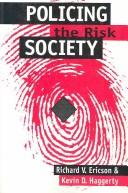| Listing 1 - 10 of 23 | << page >> |
Sort by
|
Book
ISBN: 0409829242 Year: 1981 Publisher: Toronto, Ont. Butterworths
Abstract | Keywords | Export | Availability | Bookmark
 Loading...
Loading...Choose an application
- Reference Manager
- EndNote
- RefWorks (Direct export to RefWorks)
Sociology of law --- Criminal law. Criminal procedure --- detectives
Digital
ISBN: 9781442679245 Year: 2016 Publisher: Toronto, Ont. University of Toronto Press
Abstract | Keywords | Export | Availability | Bookmark
 Loading...
Loading...Choose an application
- Reference Manager
- EndNote
- RefWorks (Direct export to RefWorks)

ISBN: 3110131757 3111792463 3110847760 Year: 1992 Publisher: Berlin New York W. de Gruyter
Abstract | Keywords | Export | Availability | Bookmark
 Loading...
Loading...Choose an application
- Reference Manager
- EndNote
- RefWorks (Direct export to RefWorks)
Theory of knowledge --- Sociology of culture --- Connaissance [Sociologie de la ] --- Kennis [Sociologie van de ] --- Knowledge [Sociology of ] --- Sociologie van de kennis --- Sociology of knowledge --- Civilization, Modern --- -Knowledge, Sociology of --- Knowledge, Theory of (Sociology) --- Communication --- Knowledge, Theory of --- Public opinion --- Sociology --- Social epistemology --- Modern civilization --- Modernity --- Civilization --- Renaissance --- History --- Civilization [Modern ] --- 1950-.... --- Civilization, Modern - 1950 --- -Knowledge, Sociology of. --- Knowledge, Sociology of.

ISBN: 1281994340 9786611994341 1442679387 9781442679382 9781281994349 6611994343 0802087604 9780802087607 0802085636 9780802085634 Year: 2003 Publisher: Toronto Buffalo London
Abstract | Keywords | Export | Availability | Bookmark
 Loading...
Loading...Choose an application
- Reference Manager
- EndNote
- RefWorks (Direct export to RefWorks)
Risk and Morality examines how decisions about risk and uncertainty relate to moral principles and ethical conduct. Editors Richard Ericson and Aaron Doyle have brought together in this volume a selection of original essays on the topic by renowned scholars in the disciplines of philosophy, sociology, law, political science, geography, criminology, and accounting from Canada, the United States, England, France, and Australia. Presenting cutting-edge theory and research, the essays analyse the broader social, political, economic and cultural dimensions of risk and morality.The concept of risk has become pervasive in recent years in political discourse, popular culture, organizational communications, and everyday life. The contributors' respective research projects on risk and morality in politics, business, legal regulation, crime prevention, insurance, extreme sports, and biotechnology provide original empirical evidence to substantiate their theories and address the ideological and policy relevance of their work. Collectively, the contributors explain why risk is such a key aspect of Western culture, and demonstrate that new regimes for risk management are transforming social integration, value-based reasoning and morality. Further, they illustrate that these new regimes do not necessarily foster more responsible conduct or greater accountability in institutions.
Social ethics. --- Risk --- Sociology of risk --- Sociology of uncertainty --- Uncertainty --- Sociology --- Economics --- Probabilities --- Profit --- Risk-return relationships --- Ethics --- Social problems --- Moral and ethical aspects. --- Sociological aspects. --- Sociological aspects --- Risk - Moral and ethical aspects --- Risk - Sociological aspects --- Social ethics --- Morale sociale --- Risque - Aspect moral --- Risque - Aspect sociologique --- Morale sociale. --- Risque --- Aspect moral. --- Aspect sociologique.
Book
ISBN: 9780802085627 Year: 2004 Publisher: Toronto University of Toronto Press
Abstract | Keywords | Export | Availability | Bookmark
 Loading...
Loading...Choose an application
- Reference Manager
- EndNote
- RefWorks (Direct export to RefWorks)

ISBN: 9781442675452 9780802081988 1442675454 9781281995667 1281995665 0802043925 0802081983 9780802043924 Year: 2000 Publisher: Toronto, Ont. University of Toronto Press
Abstract | Keywords | Export | Availability | Bookmark
 Loading...
Loading...Choose an application
- Reference Manager
- EndNote
- RefWorks (Direct export to RefWorks)
Digital
ISBN: 9781442682023 Year: 2019 Publisher: Toronto, Ont. University of Toronto Press
Abstract | Keywords | Export | Availability | Bookmark
 Loading...
Loading...Choose an application
- Reference Manager
- EndNote
- RefWorks (Direct export to RefWorks)

ISBN: 0802064752 9786612056086 1282056085 1442679247 9781442679245 0802055699 9780802064752 9780802055699 Year: 1982 Publisher: Toronto [Ont.] Published in association with the Centre of Criminology, University of Toronto, by University of Toronto Press
Abstract | Keywords | Export | Availability | Bookmark
 Loading...
Loading...Choose an application
- Reference Manager
- EndNote
- RefWorks (Direct export to RefWorks)
Professor Ericson and his colleagues followed the work of patrol officers in a large Canadian regional police force. From their direct observations comes a wealth of information, quantitatively assembled and qualitatively discussed, with insights into the nature of policing.This book reveals that the police are not mere 'referees' of our legal lives, blowing the whistle on our infractions. They are censors of certain types of possibly wrong actions. They are selective in their invocation of criminal law and use the law artfully to restore settings to orderliness.Ericson emphasizes the routine manner in which the patrol officer intervenes and gains compliance fron the citizenry. He demonstrates that when the criminal process is invoked, the police maintain fundamental control over the court outcome.Using these findings, he addresses basic questions about the role of police in relation to crime and how it is produced, literally, by the patrol officer. Crime is also seen as the primary basis of police legitimacy, which in turn enables the police to engage in broad surveillance and information-gathering.The author's conclusions about the nature of policing and his discussion of the implications of proposals for reform of police, will generate better-informed deliberation in political and public decision-making and in the general study of sociological theory.
343.9 --- 343.9 Criminologie --(algemeen) --- Criminologie --(algemeen) --- Police patrol --- Police --- Case studies --- Police patrol - Canada --- Police patrol - Canada - Case studies --- Canada. --- Canada (Province) --- Canadae --- Ceanada --- Chanada --- Chanadey --- Dominio del Canadá --- Dominion of Canada --- Jianada --- Kʻaenada --- Kaineḍā --- Kanada --- Ḳanadah --- Kanadaja --- Kanadas --- Ḳanade --- Kanado --- Kanakā --- Province of Canada --- Republica de Canadá --- Yn Chanadey

ISBN: 1282029452 9786612029455 1442678593 9781442678590 0802041213 0802079679 9780802041210 9780802079671 9781282029453 6612029455 Year: 1997 Publisher: Toronto, Ont. University of Toronto Press
Abstract | Keywords | Export | Availability | Bookmark
 Loading...
Loading...Choose an application
- Reference Manager
- EndNote
- RefWorks (Direct export to RefWorks)
Ericson and Haggerty contend that the police have become information brokers to institutions such as insurance companies and health and welfare organizations that operate based on a knowledge of risk.
Police. --- Police --- Risk communication. --- Risk management. --- Communication of risk information --- Cops --- Gendarmes --- Law enforcement officers --- Officers, Law enforcement --- Officers, Police --- Police forces --- Police officers --- Police service --- Policemen --- Policing --- Legal status, laws, etc. --- Insurance --- Management --- Communication of technical information --- Criminal justice, Administration of --- Criminal justice personnel --- Peace officers --- Public safety --- Security systems --- Risk communication --- Risk management --- E-books
Book
ISBN: 0919584659 Year: 1989 Publisher: Toronto, Ont. University of Toronto, Centre of Criminology
Abstract | Keywords | Export | Availability | Bookmark
 Loading...
Loading...Choose an application
- Reference Manager
- EndNote
- RefWorks (Direct export to RefWorks)
Crime in mass media --- Crime prevention --- Criminal investigation --- 343.85 --- Crime and criminals in mass media --- Mass media --- 343.85 Criminele profylaxie. Voorkomen van de misdaad. Strijd tegen de misdaad. Preventieve gevangenisstraf. Eugenese. Sterilisatie --- Criminele profylaxie. Voorkomen van de misdaad. Strijd tegen de misdaad. Preventieve gevangenisstraf. Eugenese. Sterilisatie --- Crime detection --- Crime investigation --- Criminal investigations --- Detection of crime --- Investigations --- Law enforcement --- Crime scenes --- Detectives --- Forensic sciences --- Suspects (Criminal investigation) --- Crime --- Prevention of crime --- Public safety --- Citizen participation --- Prevention --- Government policy --- Crime Stoppers (Canada) --- Criminology. Victimology --- Informers
| Listing 1 - 10 of 23 | << page >> |
Sort by
|

 Search
Search Feedback
Feedback About UniCat
About UniCat  Help
Help News
News